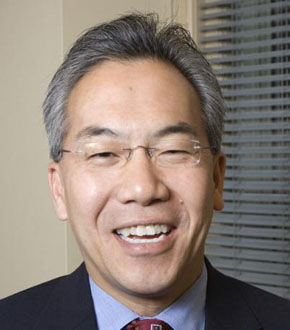‘Americans don’t understand how much they’ve benefited’

Vincent Mor is professor of health services, policy, and practice at Brown University.
“The mandate is important because it then stimulates all the efforts on the exchanges. Some states, like Rhode Island, will push really hard on the exchanges and get them up and moving quickly and will have to decide how much of the Medicaid expansion gets done under the exchanges or is merely administered under Medicaid. That is where some states will have some differences in how they do that. The nitty gritty detail is where a lot of the money lies right now.”
“I don’t think [the court’s ruling that Medicaid funds cannot be withheld to penalize states] is much of a limitation. The federal government was never going to say, ‘Oh, if you don’t do this, then you are on your own on for all your maternal child health.’ They were never going to do that. There was never any intention of lowering that boom.”
“In terms of what this means moving forward, personally, my son who is 23 gets to stay on my health insurance policy, which I like. I’m sure that most Americans don’t understand how much they’ve benefited and that’s one way I know I have. Secondly, the exchanges will move forward and I think some states are basically going to stonewall and it will be unfortunate for their citizens. And then the real challenge, as Massachusetts is experiencing right now, is how do you go to the next step and keep costs down because that’s the real challenge. There is nothing in this law that has anything to do with cost containment, other than some provisions for Medicare.”
‘We will soon reap the benefit’

Terrie (Fox) Wetle is associate dean of medicine for public health at Brown University.
The Supreme Court’s decision today has far-reaching implications for our nation’s health and is tremendously important for Rhode Island. Our state is a national leader in developing a health insurance exchange and in planning other aspects of health reform. The court’s decision to uphold most aspects of the Affordable Care Act allows both federal and state policymakers to move forward with the complex implementation of law.
Future generations will look back on today’s decision as an important step in assuring that all Americans will have health care coverage and will have access to crucial preventive services. I am optimistic that we will soon reap the benefit of a healthier population.
‘RI will continue to be national leader’

Christopher Koller, Rhode Island’s commissioner of health insurance, is a clinical teaching associate in community health at Brown University.
“Rhode Island will continue to be national leader in using resources in [the] Affordable Care Act to improve affordability, accessibility, and quality of health care in our state. The decision is also a boost for the University’s commitment to be a national leader in primary care training, health services research, and public health.”
In a news release from the governor’s office Koller added, “For the Office of the Health Insurance Commissioner, this means proceeding with our nationally recognized rate review process, implementing commercial insurer affordability standards that advance the commission’s work, and ensuring compatibility between federal and state health insurance laws to protect Rhode Island consumers.”
‘Better and more cost-effective health care’

Dr. Glenn Tung is professor of diagnostic imaging and associate dean for clinical affairs at the Warren Alpert Medical School of Brown University.
“From a policy view, the court’s ruling today validates the Patient Protection and Affordable Care Act of 2010, its individual mandate, and two key insurance-market reforms — ‘guaranteed issue’ and ‘community standard’ — which will require health insurers to accept all applicants and set premiums that will not vary because of health status. The notable exception is that the court limited federal enforcement of the Medicaid expansion required of states.
“It is interesting from a legal view that in upholding the law the court has also bolstered conservative views on the limitations of government to regulate the inactivity of citizens under the Commerce power and states’ executive authority.
“Speaking as a physician, I am very pleased that the Affordable Care Act has been upheld. Ultimately, I believe, it will lead to better and more cost-effective health care for all Americans.”
‘The nail biting is over’

Eli Y. Adashi, professor of obstetrics and gynecology, is the former dean of medicine at the Alpert Medical School.
“The nail biting is over. The Affordable Care Act has been upheld thereby assuring its continued implementation. Rhode Island and other states can now finally move forward without concern that that they might be second-guessed. Imperfect as the Affordable Care Act may be, it is a huge step in the right direction, not to mention a remedy of grave social injustice. Bending the cost curve will fall to the next president(s) to tackle whoever that may be. Any other outcome would have set health care in United States back on an uncertain course. President Obama can and should be proud with this his signature legislative achievement.”
‘Now people will have the insurance to get the care they need’

Health economist Judith Bentkover is adjunct professor of health services, policy and practice and academic director of the University’s new masters program in health care leadership.
“I’m delighted that the mandate survived. Now we’re really going to be on our way to insuring all of our citizens, and containing costs and achieving the triple aim which is defined as patients experiencing a high quality of care, the population becoming healthier, and costs being contained. I think this will help the markets work more efficiently. Now people will not be forced to put off necessary care. They will have the insurance to get the care they need. They’ll get preventive care so they won’t end up in high-cost inefficient emergency rooms.
“In Rhode Island we’re leading the way with our health care exchange. The 16 percent of Rhode Island’s non-elderly population who lacked health insurance will be reduced in number, not totally eliminated. Also, 20 percent of all private employment in Rhode Island is in health and social services. This mandate now is going to bring more people into the system and increase the demand for health care workers which will help the Rhode Island economy.”
